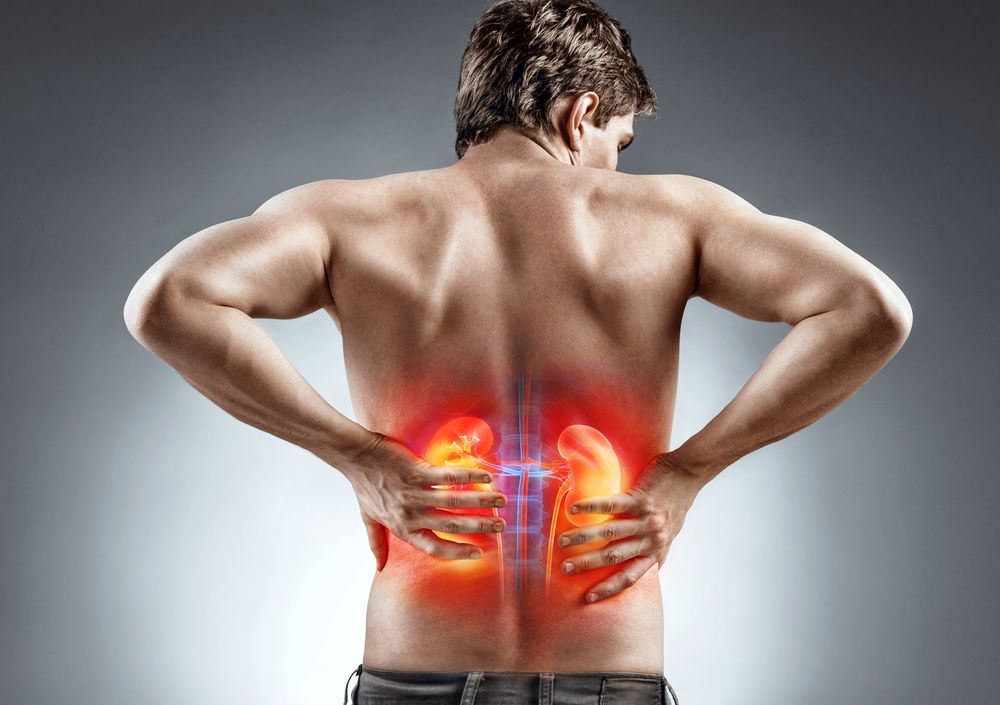Kidney infections (also called pyelonephritis) are a type of urinary tract infection (UTI) that begin in the bladder or urethra and travel to the kidneys. They can be life-threatening, so it is important to see a doctor the moment you believe you may have one.
You cannot cure a kidney infection at home, but there are some home remedies to help ease symptoms. (Learn More — Kidney Infections)
Some home remedies include drinking water and applying heat to painful areas. Some pain relievers can address pain and fever symptoms, but others can thin your blood and cause further problems. Make sure you know if a medication is safe before using it.
Some evidence suggests that drinking cranberry juice and green tea may help with kidney infections, but the research is not definitive. (Learn More — Helpful Remedies at Home)
Preventing a kidney infection before one starts is ideal, especially because such infections risk permanent damage. Drinking plenty of liquids, urinating as soon as you feel the urge, and practicing good hygiene habits can all help reduce your risk of infection. (Learn More — Avoiding a Kidney Infection Before It Starts)
Again, curing a kidney infection at home is not possible. You will need a doctor to properly diagnose you, and you’ll need to take prescription medication.
Kidney infections can be life-threatening and cause permanent damage, so do not delay in seeking help. (Learn More — Dispelling Myths)
Kidney Infections
A kidney infection (also called pyelonephritis) is a type of urinary tract infection (UTI) that begins in the bladder or urethra and travels to one or both kidneys. Kidney infections can be very serious, potentially causing permanent damage to your kidneys or causing bacteria to spread into your bloodstream.
These are signs you may have a kidney infection:
- Pus or blood in your urine
- Urine that smells or appears cloudy
- Burning or pain when you urinate
- A persistent, strong urge to urinate
- Frequently urinating
- Nausea, including vomiting
- Fever and chills
- Pain in your side, back, flank, groin, or abdomen
If you are being treated for a UTI but symptoms don’t seem to be improving, you may have a kidney infection. Talk to your doctor about this possibility, and be sure to mention that your current treatment plan does not seem to be working.
While there are ways to ease symptoms at home, it is important to remember that home remedies alone are not a safe way to deal with a kidney infection. If you have any reason to believe you have a kidney infection, see a doctor. You will need antibiotics. In severe cases, hospitalization may be required.
Helpful Remedies at Home
While there is no remedy on par with medication in terms of efficacy, there are a few home treatments that can potentially lessen your symptoms as you wait for your prescribed treatment to take effect.
 Here are some helpful home remedies for a kidney infection (many of which also help with less serious UTIs):
Here are some helpful home remedies for a kidney infection (many of which also help with less serious UTIs):
- Drink water. The National Institute of Diabetes and Digestive and Kidney Diseases advises drinking 48 to 64 ounces of water a day if you have a kidney infection, as this can help flush out bacteria from the kidneys. If your kidneys are failing, your water intake will generally have to be lower. Check with a doctor to make sure you are helping rather than hurting yourself.
- Drink cranberry juice. Experts disagree on whether cranberry juice is effective in helping with kidney infections and UTIs. Some animal studies suggest cranberry juice can help kill UTI bacteria. It is unlikely to cause any harm, but you may wish to discuss drinking cranberry juice with your doctor.
- Drink green tea or take green tea extract. Some research suggests that green tea may help to fight UTI bacteria, but there is not enough evidence to make solid claims. Since it won’t cause harm, you may want to try it anyway.
- Apply warm, moist heat. Applying heat to the affected area for 10 to 15 minutes can help to soothe your pain. It is usually suggested that you cover the heated object with cloth or a similar material to reduce the risk of burns.
- Try OTC pain relievers. Over-the-counter (OTC) pain relievers, such as ibuprofen (Advil) and acetaminophen (Tylenol), can relieve pain and reduce fever symptoms. Some pain relievers, such as aspirin, can thin your blood, which can actually cause complications with more blood mixing into your urine. Unless you’re certain a particular medication is safe, ask a doctor before taking it.
Avoiding a Kidney Infection Before It Starts
In medicine, the best solution to a problem is prevention. This is especially true with a condition like a kidney infection, where permanent kidney damage is one of the potential risks.
There are a few fairly easy habits to adopt that can prevent kidney infections and similar problems.
- Drink plenty of water
- Urinate when you get the urge rather than waiting
- Urinate promptly after sex
- Wipe from front to back, to keep fecal matter away from the urethra
- Avoid deodorant sprays or douches
Women are generally at greater risk of contracting a kidney infection than men. This is because the urethra is closer to the anus in women, which can make it easier for bacteria from the anus to get into the urethra and cause problems. For this reason, it is important to be conscious of this risk and practice good hygiene habits to prevent contamination.
Dispelling Myths
Any claims that a kidney infection can be fought purely with home remedies are false. A kidney infection requires antibiotics.
 Antibiotics are generally only available by prescription in the United States, and for good reason. Overuse can create dangerously resistant bacteria and make them less effective. Additionally, they can harm helpful bacteria in the body. Antibiotics have their own set of risks, so their use is particular enough to warrant a doctor’s oversight.
Antibiotics are generally only available by prescription in the United States, and for good reason. Overuse can create dangerously resistant bacteria and make them less effective. Additionally, they can harm helpful bacteria in the body. Antibiotics have their own set of risks, so their use is particular enough to warrant a doctor’s oversight.
If you are experiencing symptoms, you need to get an accurate diagnosis from a doctor as soon as possible. A licensed professional should examine you to make sure your symptoms are not something more serious and to assess whether your kidneys are damaged.
You will likely have to see a doctor in person, rather than online, as they will need to take a urine sample and possibly perform other tests to properly diagnose your condition.
References
Kidney Infection: Symptoms & Causes. (March 8, 2018). Mayo Foundation for Medical Education and Research (MFMER).
Kidney Infection: Diagnosis & Treatment. (March 8, 2018). Mayo Foundation for Medical Education and Research (MFMER).
Kidney Infection. American Kidney Fund.
Can Home Remedies Help With a Kidney Infection? (July 29, 2019). Medical News Today.


